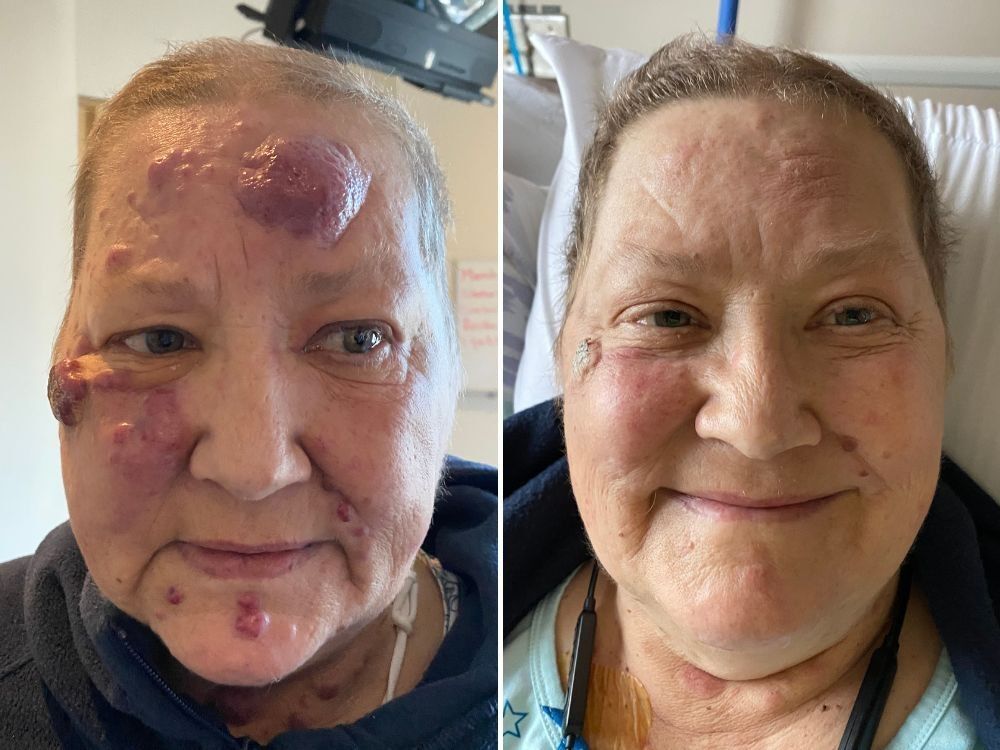
Beverly Henry had accepted death, what was harder to accept was the assault that her rare and aggressive form of cancer was taking on her appearance.
Huge sores, one the size of a ripe avocado on her forehead, covered the 62-year-old’s body; when she did still have to go out, it was with a mask and a hood.
Chemotherapy sessions had achieved nothing and she was given days to live, when Henry suddenly got a call from the new Hematology Research Unit (HRU) at Vancouver General Hospital in mid-March to undertake a clinical trial with drugs never before administered in B.C.
“My last week at home, my mom didn’t see me because I was upstairs in bed, there was nothing left in me,” Henry said. “When I came down and I got that phone call to come to VGH, and my mom saw me, there was horror in her face just to see how much I’d deteriorated in a week’s time.”
Henry had been diagnosed with acute myeloid leukemia in November, and when her specific subtype didn’t respond to multiple rounds of chemo, her doctors ran out of conventional treatment options.
So what they did, her hematologist said, was speed up the activation of an early phase clinical trial specifically designed for Henry’s subtype of acute myeloid leukemia.
Her medical team were stunned at the results.
“I didn’t expect that this drug would give me back six weeks of time that I didn’t really have,” Henry said. “There was a good chance I was going to come in here and it was too late. But here I am.
“Don’t give up hope that someone is going to walk through the door today and you might get the same chance that I have.”
When Henry was admitted to the trial, leukemia was visible on her skin from head to toe, said Dr. Florian Kuchenbauer , a clinician scientist dealing in leukemia and bone marrow transplants at VGH.
“We were not sure if she would survive the next days,” he said. “Remarkably, she responded so well to the investigational treatment that she became nearly unrecognizable, in the best way.
“It was mind-blowing.”
Henry will stay on the study drug — because of its experimental state, Kuchenbauer said he couldn’t name the company that makes it but said he was on the phone constantly with the pharmaceutical firm during Henry’s trial.
“The study drug has given her at least two additional months of life so far, time spent outside the hospital, with improved quality of life,” Kuchenbauer said.
“While her leukemia will eventually progress, the drug is effectively slowing it down, giving her more time.”
Chemo is a one-size-fits-all approach to fighting cancer, he said.
Leukemia is an accumulation of useless immature blood cells that clog up the production of blood, and the clinical drug “pushes them to become a more mature cell,” Kuchenbauer said.
“This means that these cells eventually die off and this is what the drug is basically doing that chemotherapy had not achieved, because her cells were resistant to chemotherapy.”
The new HRU, the first of its kind in the province, was made possible through Greater Than Cancer , a fundraising campaign undertaken by VGH and the University of B.C. Hospital Foundation, whose goal is to raise $35 million for cancer research.
The facility is a dedicated in-patient Phase I Clinical Trial Unit, meaning patients can stay several weeks while receiving cutting-edge treatments and have access to the full spectrum of VGH specialties, Kuchenbauer said. It’s located within the leukemia/bone-marrow transplant unit on the 15th floor at VGH.
Results such as Henry’s excite Kuchenbauer.
“We thought she was going to die, we talked about hospice and she was ready to die,” he said. “This gives her more time … and that’s the most precious thing we have, right?”
Related
For more health news and content around diseases, conditions, wellness, healthy living, drugs, treatments and more, head to Healthing.ca – a member of the Postmedia Network.